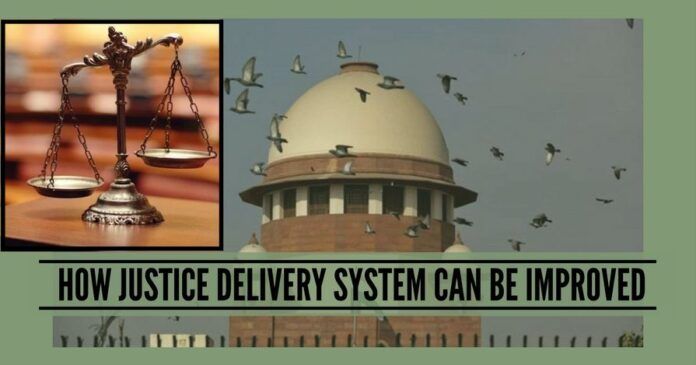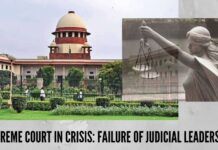
As a first step, the CJI, in consultation with the Government and Opposition, can set up a Task Force to redesign our Justice Delivery System.
There was this interesting Op-Ed in Times of India on 24-8-17 by Arghya Sengupta titled, “Let’s talk about discrimination”. It argued that though the final 3:2 verdict of the Supreme Court on Triple Talaq has been positive and along expected lines, there are multiple contradictions within and across the judgments of each of the individual judges.
That is, using the same set of laws and the same set of facts of the case placed before them, the learned judges of the SC (or of any court for that matter) often arrive at different sets of conclusions. There have been many such cases where neutral observers have felt that judgments pronounced by different judges are contradictory.
At different points in time, or even at the same time but in different Court Rooms, if different judges come to occupy the chairs, the judgments on the same case are different. In effect, what this means is, judgments are more a function of the judges delivering the judgments than the facts of the cases, and law.
When civil, revenue, service, sales tax and such cases (which constitute the highest % of pending cases) are presented before trial courts, they arrive at certain conclusions; if escalated, at High Courts, these are either accepted or overturned, and at the SC, the HC judgments are again either accepted or overturned.
What happens when a final judgment (say by an HC or the SC) is given 10, 20, 30, 50 years after the case is brought to the lowest Court?
Typically at the trial courts, the cases drag on for decades, then if escalated, they take some more years at HCs, and yet more time at the SC.
What is the probability that a judgment will be ‘right’ (assuming one side is right)? Surely not 100%, probably not even 75%; hopefully somewhere between 50% and 75%; some believe it’s likely to be only about 51%. But there are those who wonder, with the prevailing levels of corruption, whether it is not less than 50%.
Let’s imagine, only for the sake of argument, that court cases were decided purely on the basis of ‘toss of a coin’, outrageous though such a proposition may be. The judgment can be delivered instantly. What will be the probability that the judgment would be right (again assuming one side is ‘right’)? A whopping 50%. We can eliminate corruption completely.
Please don’t hasten and get me wrong. I’m not going to suggest anything outrageous.
The question then arises as to whether all the years of painful court hearings, costs being borne by both the parties, etc are all only to improve the correctness of judgment from 50% to say 51% (or whatever % you reckon).
What happens when a final judgment (say by an HC or the SC) is given 10, 20, 30, 50 years after the case is brought to the lowest Court? The loser may lose but the winner also most often loses. Both sides lose their precious time enormously, lots of money, sleep, and peace of mind, and often relationships.
Technology can be used extensively in the alternative system; the need of the judge to meet the parties multiple times should be re-thought as it could lead to corruption.
There are many grandchildren who fight their grandparents’ cases. So, the grandparents and the parents of the winning side also lost the cases even before the cases are decided many years hence, because what happens after their lifetime means nothing to them.
So, would we like courts to deliver slightly more than 50% correct judgments (but hypothetically assumed as correct) when most of the litigants (both sides) lose their time, money, peace of mind, sleep, relationships, etc, regardless of who is right and who is wrong, or would we rather have a similar % of correct judgments in reasonable (3 months to 1 year) time period, using a different method?
The purpose of this article is not to trivialize courts, judges or the judicial system. I’m saying the same thing we’ve all been saying all along, that we need to speed up our justice delivery system by several orders of magnitude. Given that we have not been able to do anything tangible about it substantially so far, I’m just arguing forcefully that we need to think differently.
The entire judicial process should be re-engineered ground up, involving people from other streams (esp Industrial Engineers who improve and speed up processes in business & industry), because there is huge vested interest for legal professionals to keep court cases pending for ages. Inbreeding hasn’t improved our judicial system.
Go to any court, and you can see 100s of people sitting and wasting their time, only to be told after many hours that the case has been adjourned without a word uttered.
Do legal professionals have any concern for the time and money of litigants being wasted like this? When the affected people are the clients and not the legal professionals, how is it that all decisions about the legal system are taken solely by the legal fraternity, and not by the litigants who are the biggest stakeholders?
Technology can be used extensively in the alternative system; the need of the judge to meet the parties face to face multiple times should be re-thought, as this not only wastes everyone’s time but also leads to corruption.
The practice of giving multiple adjournments is another problem. Adjournments are given taking into account the convenience of the judge, and sometimes of the lawyers. We should identify the few (say a maximum of 3 or 4) occasions when the presence of the parties is vital, and the rest of the times, the parties should be permitted to file their pleas/ responses with the court administration, preferably online with appropriate (Aadhar-like) authentication.
When we redesign the system, we should set goals and work towards them; e.g., we should find a way to have the first ‘de facto’ judgment delivered quickly, say within 3 months (based on ‘prima facie’ evidence, and placing the onus of proof of innocence on the ‘prima facie’ loser). This is not my idea, but the suggestion of a retired High Court Judge. I’ve explained this in detail in my article titled “How To Improve The Quality And Speed Of Justice Delivery System? A Retired Judge Provides Solution”.
Chances are that the % of correctness of such judgments in such a system may be as good as (or even better than) what we have in the current system
How to include the statements/ submissions of the witnesses, their cross-examination, etc within this time, how much of it can be done online, is all a matter of detail; a way can be found, if we objectively agree that we have been having a major legacy problem at hand with no solution at sight.
Chances are that the % of correctness of such judgments in such a system may be as good as (or even better than) what we have in the current system as already discussed. And post-judgment, within months, people can get on with their lives. People would not have lost a lot of money, time, sleep and peace of mind. Corruption would have been minimised. Soon we will have no backlogs in courts. And we may not need to increase the judge or court count and incur additional costs, since we’re only increasing the efficiency (and effectiveness, if you will) of the system.
Initially, it can be tried out on a Pilot scale, and once the rough edges are smoothened, we can implement on larger scale.
As a first step, the CJI, in consultation with the Government and Opposition, can set up a Task Force consisting of professionals from multiple relevant realms and typical litigant representatives with no conflict of interest to redesign our Justice Delivery System.
Note:
1. Text in Blue points to additional data on the topic.
2. The views expressed here are those of the author and do not necessarily represent or reflect the views of PGurus.
- How BJP can get 33%+ vote share in TN - April 1, 2024
- A transparent, equitable electoral funding alternative - March 19, 2024
- How TN BJP can come to No. 1 or No. 2 in 2024 LS polls - January 11, 2024











OMG! My thoughts! Please support my on line petition at https://www.change.org/p/the-president-of-india-and-the-prime-minister-judges-revolt-contempt-of-court and there are links to a three part critique ob the judges’ revolt there too!
[…] have been calling for many changes in our justice delivery system, the most important one being, “once prima facie guilt is established on anyone by a court, […]
[…] How Justice Delivery System Can Be Improved 1000% At No Extra Cost – Dec 15,2017, PGurus.com […]
[…] When there was a breakdown of the national financial system, we had financial reforms in 1991, which we all acclaim as the point of a turnaround in our economy. What we have today is a breakdown of our judicial system. It’s time for a turnaround with Structural Judicial reforms. […]
The existing system is buried under over weight of bureaucracy system. Notices to be delivered only by Indian posts & not by any courier agency.
While I am unaware of many other processes, hearing daily court issues, observe the process can be re-engineered to make it faster & quicker